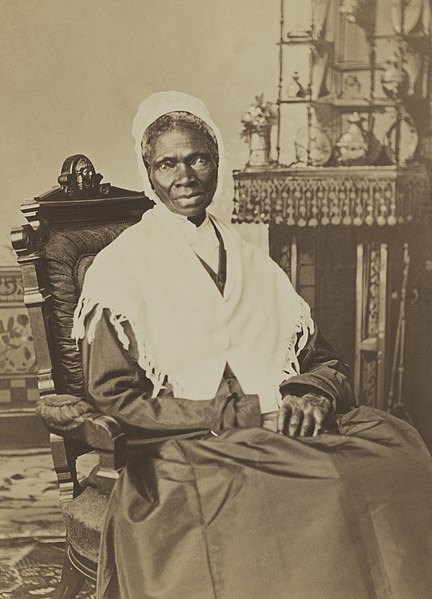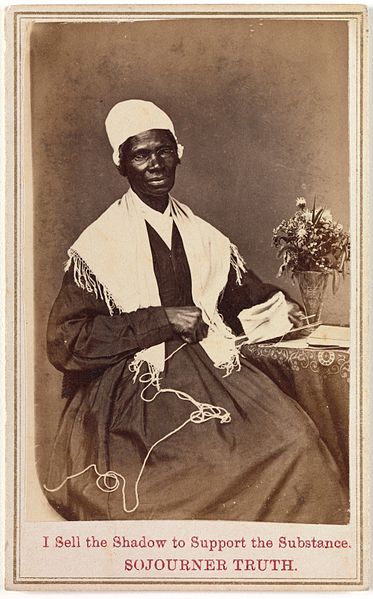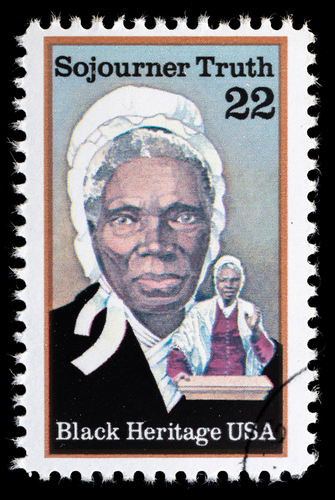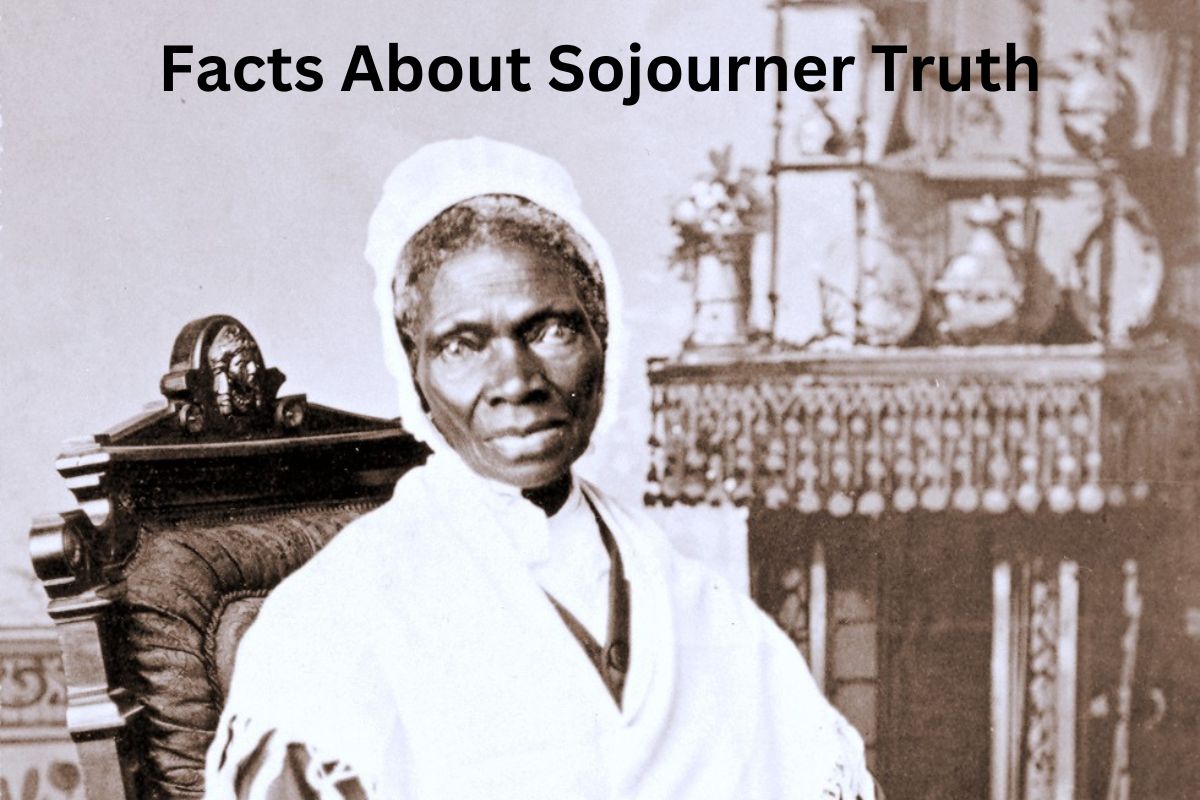Sojourner Truth, born as Isabella Baumfree in the late 18th century, was an influential African American abolitionist and women’s rights activist. Born into slavery in New York, she endured the hardships and cruelty of bondage before courageously escaping with her infant daughter in 1826.
Determined to fight for freedom and justice, she embarked on a remarkable journey of advocacy, using her personal experiences and powerful oratory skills to challenge societal norms and promote social change.
Sojourner Truth’s compelling speeches, captivating audiences across the United States, played a significant role in raising awareness about the horrors of slavery and advocating for the rights of African Americans and women.
Her legacy as a trailblazer in the fight for civil rights, gender equality, and racial justice continues to inspire and resonate to this day.
Sojourner Truth Facts
1. Sojourner Truth was born as Isabella Baumfree around 1797, in Swartekill, New York, as a slave
Sojourner Truth was born as Isabella Baumfree around 1797, in Swartekill, New York, as a slave. She was born into a Dutch-speaking household and was the daughter of James and Elizabeth Baumfree.
Also Read: Sojourner Truth Accomplishments
She was one of at least 10 children in her family. Her exact birth date is unknown, as birth records of slaves were often not kept during that time.

2. She was sold several times as a slave and experienced the hardships and cruelty of slavery
Isabella Baumfree was sold several times as a slave during her early life. She endured harsh conditions and physical abuse from her various owners. She was separated from her family members as they were sold off to different owners.
These experiences left a lasting impact on her and fueled her determination to fight for freedom and justice.
Also Read: Timeline of Sojourner Truth
In 1826, Isabella Baumfree managed to escape slavery with her infant daughter, Sophia. She made the courageous decision to flee her owner’s property, leaving behind her other children whom she could not take with her. With the help of a Quaker family, she found refuge and safety in New Paltz, New York.
3. Sojourner Truth became an important abolitionist and women’s rights activist
After gaining her freedom, Isabella Baumfree underwent a spiritual transformation and changed her name to Sojourner Truth. The name “Sojourner” represented her mission to travel and spread the truth, while “Truth” symbolized her commitment to speaking out against injustice and advocating for equality.
4. In 1851, Sojourner Truth delivered her famous speech, often referred to as “Ain’t I a Woman?”
In 1851, Sojourner Truth delivered a powerful and iconic speech that has come to be known as “Ain’t I a Woman?” This speech was delivered at the Ohio Women’s Rights Convention in Akron, Ohio. The address challenged prevailing stereotypes about women and argued for equal rights, highlighting the intersectionality of race and gender.

During her speech, Sojourner Truth eloquently questioned the societal notions of femininity and womanhood that often excluded African American women. She spoke passionately about her own experiences as both a woman and a former slave, emphasizing her strength and resilience in the face of adversity.
5. She became involved in the abolitionist movement and worked with prominent figures like Frederick Douglass and William Lloyd Garrison
Sojourner Truth played a significant role in the abolitionist movement and collaborated with prominent figures of her time, including Frederick Douglass and William Lloyd Garrison. These alliances allowed her to amplify her message and contribute to the collective efforts of the movement.
Her association with Frederick Douglass, a renowned abolitionist and social reformer, was particularly influential. The two shared common goals and beliefs in the fight against slavery and worked together to advocate for the emancipation of enslaved African Americans.
They often appeared together at public events, delivering speeches and engaging in discussions that brought attention to the injustices of slavery and the need for immediate action.
Sojourner Truth also forged a partnership with William Lloyd Garrison, an influential white abolitionist and publisher of the anti-slavery newspaper “The Liberator.” Garrison recognized her eloquence and powerful presence as a speaker, inviting her to address audiences at abolitionist gatherings and conventions. He admired her unwavering commitment to the cause and actively supported her efforts.
6. Sojourner Truth traveled extensively, delivering powerful speeches about abolitionism and women’s rights
Sojourner Truth’s commitment to advocating for abolitionism and women’s rights took her on extensive travels throughout the United States. She embarked on speaking tours that spanned various regions, allowing her to deliver powerful speeches that resonated with diverse audiences and contributed to the advancement of social justice.

Her speeches were known for their passionate and compelling nature, drawing from her personal experiences as a former slave and a woman navigating a society rife with inequality. Sojourner Truth used her eloquence and storytelling prowess to captivate listeners, engaging them in critical conversations about the pressing issues of her time.
7. She published her memoir, “The Narrative of Sojourner Truth: A Northern Slave,” in 1850
In 1850, Sojourner Truth published her memoir, “The Narrative of Sojourner Truth: A Northern Slave.” The book provided a detailed account of her life as a slave, including the physical and emotional hardships she endured.
It also highlighted her transformation into an activist and her experiences as a free woman advocating for the rights of others.
The memoir became an important document in the abolitionist movement, shedding light on the brutal realities of slavery and serving as a testament to the strength and resilience of African Americans.
8. During the American Civil War, Sojourner Truth worked tirelessly to help recruit African American soldiers for the Union Army
During the American Civil War (1861-1865), Sojourner Truth played an active role in supporting the Union cause and the abolition of slavery.
She worked tirelessly to recruit African American soldiers for the Union Army, believing that their involvement would not only contribute to the war effort but also serve as a powerful statement against slavery.
Additionally, she participated in fundraising activities and assisted in providing supplies and support to black troops and their families.
9. After the Civil War, she focused on advocating for land rights and economic opportunities for newly freed slaves
After the Civil War, Sojourner Truth focused on advocating for land rights and economic opportunities for newly freed slaves. She recognized that true freedom and equality required economic independence and self-sufficiency.
She advocated for policies that would enable African Americans to acquire land and build prosperous lives for themselves, thereby breaking free from the cycles of poverty and oppression that had plagued them for generations.
10. Sojourner Truth met with President Abraham Lincoln in 1864 and urged him to ensure that freed slaves would have the right to vote
Sojourner Truth’s meeting with President Abraham Lincoln in 1864 was a significant moment in her advocacy efforts. She urged Lincoln to ensure that freed slaves would have the right to vote, recognizing that political representation was essential for the long-term empowerment of African Americans.
While Lincoln expressed his support for her cause, it would take several more years before African Americans achieved full voting rights with the passage of the Fifteenth Amendment in 1870. Sojourner Truth continued to speak out for voting rights and remained dedicated to the cause of civil rights until the end of her life.
11. In 1867, she moved to Washington, D.C., where she worked as a counselor for freed slaves
In 1867, Sojourner Truth relocated to Washington, D.C., where she continued her activism and advocacy work. She served as a counselor for newly freed slaves and worked tirelessly to combat segregation and discrimination.
Her role in assisting African Americans in navigating the challenges of post-war society further cemented her reputation as a prominent leader and advocate for civil rights.
12. Sojourner Truth was the first black woman to win a lawsuit against a white man
Sojourner Truth’s legal victory against her former owner, John Dumont, in 1828 was a significant milestone in her life. She successfully sued Dumont to regain custody of her son, who had been illegally sold into slavery in Alabama.
This achievement not only highlighted her determination and resilience but also demonstrated her understanding of the legal system as a means of seeking justice and securing the rights of individuals.
13. Her dedication to women’s rights extended beyond race
While Sojourner Truth is widely recognized for her work in promoting women’s rights, it is important to note that her activism transcended racial boundaries. She firmly believed in gender equality and fought for the rights of all women, regardless of their race or background.
She advocated for the dismantling of social, political, and economic barriers that hindered women’s progress and pushed for equal opportunities and recognition for women across the spectrum.
14. Sojourner Truth’s legacy continues to inspire and influence the fight for civil rights and gender equality
Sojourner Truth’s speeches and writings continue to be celebrated for their profound impact on the feminist movement and the fight for racial justice.
Her eloquent and passionate delivery, combined with her authenticity and personal experiences, made her an influential figure in both movements.
Her speeches challenged societal norms, exposed the interconnectedness of race and gender oppression, and called for unity in the pursuit of equality and justice.
15. She passed away on November 26, 1883, in Battle Creek, Michigan
Sojourner Truth passed away on November 26, 1883, in Battle Creek, Michigan, at the age of approximately 86. Her contributions to the abolitionist movement, women’s rights, and the fight against racial inequality left an indelible mark on American history.
Her legacy continues to inspire and resonate with activists and advocates striving for social justice. Sojourner Truth’s life and work are celebrated through various memorials, including statues, museums, and educational programs, honoring her as a pioneering figure in the ongoing struggle for civil rights.
